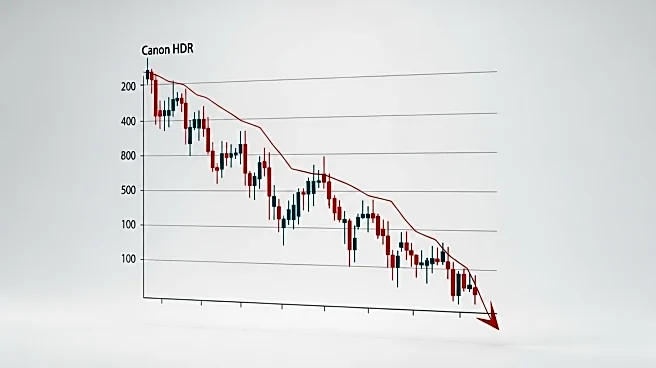What's Happening?
Figma, a design software company, experienced a significant drop in its stock price, falling as much as 16% in early trading following its first earnings report since its initial public offering (IPO) in July. The company reported a 41% year-over-year increase in second-quarter revenue, reaching $249.6 million, slightly surpassing analyst expectations of $248.7 million. Adjusted earnings per share were reported at $0.085, exceeding Bloomberg's forecast of $0.081. Despite these positive figures, Figma's guidance for the third quarter and full year did not excite investors, as it aligned closely with consensus forecasts. Additionally, Figma announced that certain conditions regarding its stock price would likely be met, leading to the early release of 25% of eligible securities owned by some employees and service providers. This early release is expected to occur following the market close on September 4, 2025, allowing these shares to be sold publicly starting September 5, 2025.
Why It's Important?
The decline in Figma's stock highlights investor concerns about the company's valuation and future growth prospects. With a market cap over 32 times its expected revenues for the fiscal year, Figma's ability to meet high expectations is crucial for maintaining investor confidence. The expiration of the lockup period for certain shares could lead to increased stock volatility as more shares become available for sale. This development is significant for stakeholders, including employees and service providers, who may seek to capitalize on their holdings. Furthermore, the broader tech industry is closely watching Figma's performance, as peers like Salesforce and Adobe face challenges from emerging technologies such as artificial intelligence. Wall Street analysts remain cautious, with only three out of ten recommending a 'buy' for Figma's stock, indicating mixed sentiment about its future trajectory.
What's Next?
As Figma navigates the post-IPO landscape, the company will need to focus on delivering consistent growth and innovation to satisfy investor expectations. The staggered release of shares through June 2026, as part of extended lockup agreements, will continue to impact stock dynamics. Figma's management may need to address concerns about its valuation and competitive positioning, particularly in light of AI's potential impact on the design software market. Investors and analysts will be closely monitoring Figma's upcoming earnings reports and strategic initiatives to assess its ability to sustain growth and adapt to industry changes.
Beyond the Headlines
The early release of shares and the subsequent stock volatility could have broader implications for employee morale and retention, as individuals may reassess their financial positions and career choices. Additionally, Figma's performance may influence investor sentiment towards other tech IPOs, particularly those with high valuations. The company's ability to leverage AI and other technological advancements will be crucial in maintaining its competitive edge and addressing potential threats from established players like Adobe.









